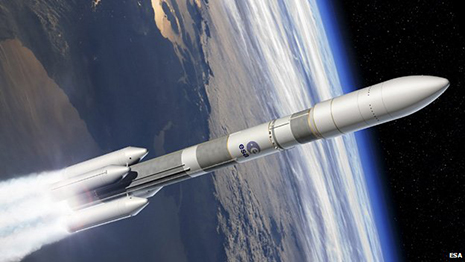The Ariane 6 will succeed the Ariane 5, which, although highly successful, is now facing stiff competition on price.
The politicians believe industry will find the new vehicle cheaper to construct and to operate.
European Space Agency member states authorised the project at a special council meeting in Luxembourg, where they also agreed funding for the space station and a rover to go to Mars.
All up, the Esa nations came forward with 5.924bn euros in contributions to cover a number of programmes over the next few years.
"I think I can summarise this ministerial council by saying it is a success; I`d even go so far as to say that it is a great success," said agency director-general Jean-Jacques Dordain.
The Ariane 5 has been operating since the mid-1990s and has come to dominate the market for putting up big commercial satellites.
But its position is now under threat from competitor services offering lower prices. The fear is that the 5`s position will be eroded inexorably in the latter half of this decade.
The Ariane 6 concept is seen as the riposte. This vehicle would employ more modern methods of production and a streamlined assembly to try to reduce unit costs.
Moreover, because the rocket`s modular design can be tailored to a wide range of satellite and mission types, it should gain further economies from frequent use.
Ministers committed 4bn euros to cover not only the 6`s development but also an upgrade to Esa`s small Italian-built Vega rocket. In future, these two vehicles will actually share some propulsion elements.
"They will be a true family with the same DNA," said Mr Dordain.
After months - and a final day - of hard bargaining, Europe`s two big space powers, France and Germany, came together to push Ariane 6 forward.
France always intended to put up most of the money, but it needed German support financially and programatically.
This it got by fulfilling commitments to the International Space Station, which Germany regards as central to its space endeavours.
The meeting agreed 800 million euros be spent on the ISS and related activities up to 2017 - just 20 million short of what had been asked at the start of the day.
This was achieved in part by the Italians promising to return eventually to funding levels it withdrew from a couple of years ago, and by the UK, which gave a "one-off" payment to the ISS at the last ministerial gathering in 2012, coming up with a further, increased contribution.
The third big issue for the Luxembourg gathering concerned the ExoMars rover, which is due to be sent to the Red Planet in 2018 to search for signs of past or present life.
It is a project with a troubled history that has come within a breath of being cancelled on more than one occasion.
Its persistent woe has been a shortfall in the money needed to carry the venture through to completion. This gap is on the order of 200 million euros. Ministers could only promise 140 million euros in Luxembourg, even after the UK and Italy, the "champions of ExoMars", upped their participation. But Mr Dordain told reporters the sum was enough for now to keep the mission on track.
"It means I can sign industrial contracts next year," he explained.
Other programmes to be approved at the meeting included the next phase of Sentinel-6, a future satellite for the EU to measure the shape of the oceans; and "AnySat", which is a concept for small, adaptable telecommunications spacecraft.
More about:
















































